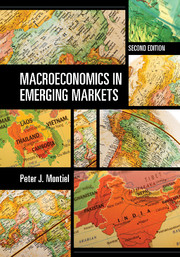Book contents
- Frontmatter
- Contents
- Preface
- PART 1 THE MACROECONOMIC FRAMEWORK
- PART 2 A BENCHMARK MACROECONOMIC MODEL
- PART 3 PUBLIC FINANCE AND MACROECONOMIC PERFORMANCE
- PART 4 MONETARY INSTITUTIONS AND MONETARY POLICY
- PART 5 EXCHANGE RATE MANAGEMENT
- PART 6 THE FINANCIAL SECTOR AND MACROECONOMIC PERFORMANCE
- 20 Finance, Welfare, and Growth
- 21 Financial Repression
- 22 Financial Reform
- 23 The Benchmark Model with Banks
- 24 Coping with Capital Inflows
- PART 7 VARIETIES OF EMERGING-MARKET CRISES
- Index
- References
23 - The Benchmark Model with Banks
Published online by Cambridge University Press: 05 June 2012
- Frontmatter
- Contents
- Preface
- PART 1 THE MACROECONOMIC FRAMEWORK
- PART 2 A BENCHMARK MACROECONOMIC MODEL
- PART 3 PUBLIC FINANCE AND MACROECONOMIC PERFORMANCE
- PART 4 MONETARY INSTITUTIONS AND MONETARY POLICY
- PART 5 EXCHANGE RATE MANAGEMENT
- PART 6 THE FINANCIAL SECTOR AND MACROECONOMIC PERFORMANCE
- 20 Finance, Welfare, and Growth
- 21 Financial Repression
- 22 Financial Reform
- 23 The Benchmark Model with Banks
- 24 Coping with Capital Inflows
- PART 7 VARIETIES OF EMERGING-MARKET CRISES
- Index
- References
Summary
Chapter 20 emphasized that financial intermediation is a vital productive activity and is often performed by specialized firms that act as middlemen between borrowers and lenders. As we saw there, commercial banks are among the most important such firms in all countries, even in those where other forms of financial intermediation are well established. But in most developing countries, where securities markets are often rudimentary, commercial banks tend to dominate in performing the financial intermediation function, at least in the formal sector of the economy.
Despite this key role of banks, the analytical model that we developed in Part 2 of this book was based on an economy in which all financial intermediation was conducted through anonymous securities markets rather than through banks. Accordingly, that model analyzed monetary policy and monetary transmission in a context in which there were only two types of domestic financial assets: currency and interest-bearing securities issued by the domestic government. Because there were no banks in the model, there was no role in the model for bank deposits or bank loans. Having explored the microeconomic role of banks in the preceding chapters, however, we can now consider a more realistic framework for the domestic financial system, one in which banks play a central role as financial intermediaries in the domestic economy. This chapter will therefore examine how monetary policy works in a liberalized bank-dominated financial system, that is, a financial system in which banks are the dominant form of financial intermediaries but in which the banking system is not repressed so there are no interest rate restrictions or directed credit.
- Type
- Chapter
- Information
- Macroeconomics in Emerging Markets , pp. 558 - 576Publisher: Cambridge University PressPrint publication year: 2011



